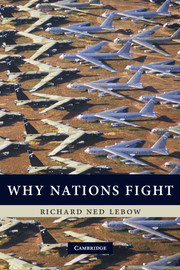1 - Introduction
Published online by Cambridge University Press: 05 June 2012
Summary
War is a poor chisel to carve out tomorrow.
Martin Luther KingOrganized violence has been the scourge of humankind at least as far back as the Neolithic era. The twentieth century suffered through two enormously destructive world wars, each of which gave rise to major postwar projects aimed at preventing its reoccurrence. The victors of World War II were largely successful in making Europe a zone of peace, but not in staving off the fifty plus interstate wars fought in other parts of the world during the last six decades. These “small” wars wasted lives and resources that might have been more profitably directed to education, welfare and development. Anglo-American intervention in Iraq is estimated to have caused anywhere from 600,000 to one million lives and will cost the US upwards of US$3 trillion if veteran benefits and health are included.
There is a consensus among scholars that interstate war – in contrast to intrastate violence – is on the decline. Figure 1.1 shows the number of ongoing interstate, colonial and civil wars across the decades since 1945. Wars of colonial independence end in the 1980s and civil wars show a sharp drop after the end of the Cold War. However, several nasty civil conflicts, including the rounds of violence associated with the breakup of Yugoslavia, were sparked by the end of the Cold War, the dissolution of the Soviet Union and the collapse of other communist regimes. Interstate wars, relatively few in number, show a slight decline.
Information
- Type
- Chapter
- Information
- Why Nations FightPast and Future Motives for War, pp. 3 - 22Publisher: Cambridge University PressPrint publication year: 2010
